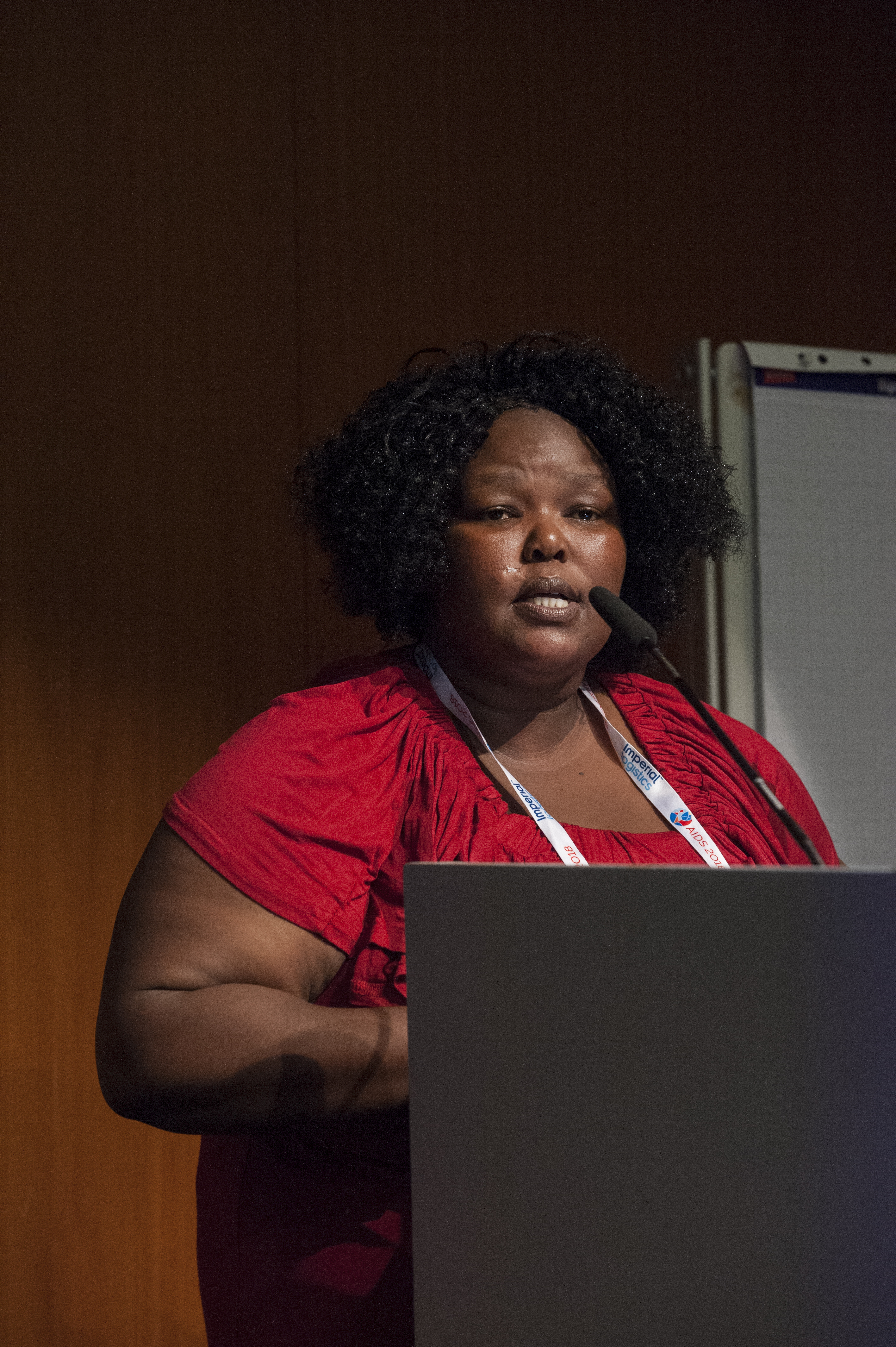World AIDS Day 2018: A Conversation with Dudu Dlamini
In honor of World AIDS Day, and this year’s theme of “Know Your Status,” the Coalition asked each of our Ambassadors why it is so important for people to know their status and what they think may be standing in the way.
In the third in this series, we spoke with Prudence Mabele prize winner, Duduzile Dlamini. Dudu runs the Sisonke project, a movement of sex workers, which is part of SWEAT Mothers for the Future, South Africa.

Coalition Ambassador, Dudu Dlamini, speaks at an AIDS 2018 panel discussion.
Why is it so important for sex workers to know their HIV status?
It is important for sex workers to know their status so that they are able to get treatment and support. Sometimes, because of stigma and discrimination, they do not get tested and do know their status in time. Yet, because they are selling sex, they are at high risk of being affected by HIV.
What are the challenges sex workers face in knowing their status?
Many sex workers do not have IDs or proof of an address. They may be living outside. They are not able to access public health services. But the biggest challenge is the way the public treats them – they are stigmatized, discriminated against and stereotyped, even by health workers at clinics.
I have talked to sex workers who are HIV positive mothers about why they were defaulting on taking their medication. Many told me that they were turned away from the clinic; that they were called names. Some who live outside were told that they smelled. These women didn’t complain about not having food or anything else. What they complained about was the rudeness of the health workers.
In South Africa, sex work is criminalized. When they are arrested, sex workers are not allowed even to take their medication. Sometimes it is taken from them or even destroyed. Sex workers are scared to identify themselves in public clinics in South Africa because of the way they are treated. They don’t want to have to explain to nurses that they defaulted on taking their medication because they were arrested. Criminalization makes them so vulnerable.
What kinds of programs, services and support would help sex workers in determining their status?
My organization, Sex Workers Education and Advocacy Task Force (SWEAT), supports a clinic in Capetown which provides services and testing. It also provides mobile testing. We also have a helpline where sex workers can call and report human rights violations. It is a safe space for sex workers to share their experiences and challenges. The helpline provides counseling, legal advice and helps sex workers to feel more empowered. More programs like this, and those of partners that work on programs for testing and treatment of TB and HIV, are needed.
What are the biggest gaps in reaching HIV-affected sex workers and their families with the appropriate testing, treatment, care and support?
There is still a gap when it comes to psychosocial support for sex workers and their children. Even though they know their status and take medication, many are staying in shelters and don’t have long term psycho-social support.
It is not not only HIV that affects sex workers. We need a full sexual and reproductive health and HIV package, as well as a children’s package, to ensure they are able to cope with other challenges like gender based violence.
Making sure that they have IDs, proof of address and access to shelters are gaps that need to be filled as well. There need to be more home visits.
What are some accomplishments about which you are excited?
I am excited about the Mothers for the Future project which ensures mothers test, know their status and take their ARVs. But when I returned to South Africa after the AIDS 2018 conference, many of the mothers in the program had defaulted on their treatment because they were not receiving support!
So, I started a campaign – Leave No One Out. The purpose of this campaign is to make sure we are not leaving sex workers or children of sex workers or any vulnerable people out of efforts to end AIDS. Let’s make sure they are on treatment and receiving support.
We are working to make it easy for them. Through a partnership with SWEEEP (a SWEAT program), every Wednesday, sex workers can come in for testing or to take medication. If the medication is here, it is very easy for them. If there are mothers that are negative, we are able to get them on PrEP. If a person doesn’t come one night, another person from the support group will fetch their medication for them. Nurses, professional counselors and others are available to them. We want to now monitor and evaluate this program to see how much this is helping.
On this World AIDS Day, what message would you like to give the world?
Who is caring about children of sex workers in their planning? Who is including these children and putting them first?
I have never heard, in my whole life as an activist, one mention of children of sex workers in any plan on HIV and AIDS. But these children are more vulnerable than others. They are doubly and triply vulnerable to HIV and AIDS. If mothers are still defaulting on their medication and still having a challenge of getting their status, what about their children?
We must not leave any of the key populations out of plans and budgets. They must be included everywhere so that they can get full support. On HIV, we are still failing. We are not going to be able to reach 90-90-90 if we leave key populations out of it.